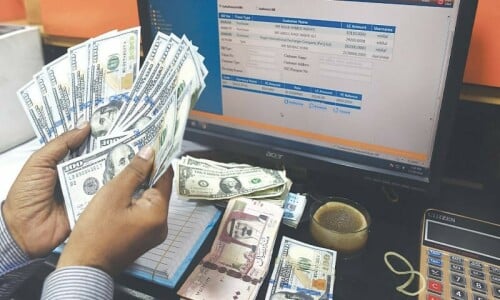KARACHI: During a treasury note auction on Wednesday, the government raised far more money than the maturity amount, exceeding its aim by a large margin.
Notably, despite anticipations that falling inflation would enable the government to borrow at a lower cost, the cut-off yields on T-bills stayed unchanged.
Inflation dropped to an almost two-year low of 20.7% in March, suggesting a downward trend that may lead the State Bank of Pakistan (SBP) to lower the historically high policy interest rate of 22 percent. The upcoming interest rate trend is indicated by the most recent T-bill rates, nevertheless.
With three-month bills priced at 21.66 percent, six-month bills priced at 21.31 percent, and 12-month bills priced at 20.84 percent, the government raised Rs82.7 billion.
T-bill auction surpasses goal; excessive borrowing continues
Despite the government’s goal of raising Rs525 billion through this auction, just Rs173 billion was realized as maturity. This suggests that the government is borrowing more than is necessary, increasing the nation’s debt and requiring a sizable portion of its earnings to be used for debt servicing.
Although experts and analysts predict a rate reduction in the monetary policy meeting on April 29, the SBP’s cautious stance is evident in its decision to keep cut-off yields at 21.6pc. High inflation forecasts, which the IMF estimates would average about 25 percent for FY24, a senior analyst said, might discourage the SBP from cutting interest rates, as was the case with the previous monetary policy in March.
The commerce, industry, and agriculture sectors have expressed disapproval of the way that persistently high interest rates have hindered economic progress. These industries claim that the pricey money raises operating expenses and exacerbates inflationary pressure. Some bankers said that the low pace of economic growth is the result of the central bank’s policies failing to control inflation.
For FY24, the World Bank projects a 2% GDP growth. Given the high costs facing most economic sectors, this figure is questioned by many in the financial market. Because of their high production costs, exporters are arguing for lower interest rates because they are no longer competitive in global marketplaces.








